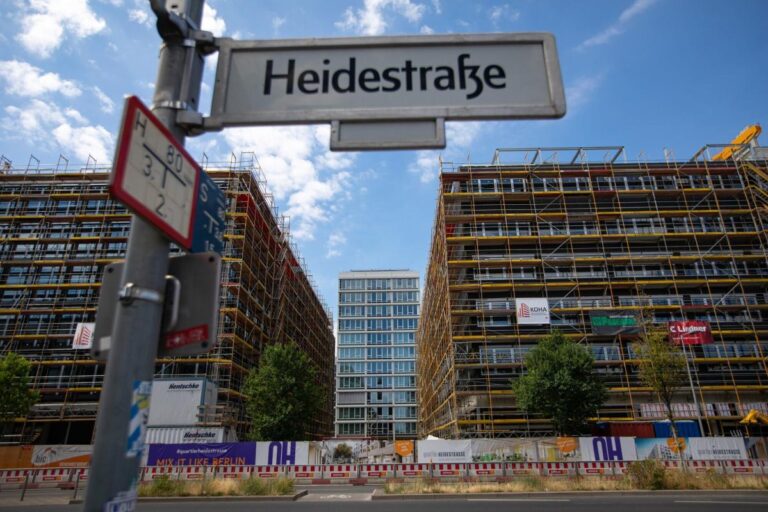(Bloomberg) — Just two years ago, Aggregate Holdings SA acquired Berlin’s Fürst Project, with plans to create 2 million square feet of space on the busy Kurfürstendamm boulevard. It was a proud expression of ambition. In hindsight, it’s just evidence that German real estate developers are in trouble.
Most Read Articles on Bloomberg
The project’s senior creditors, including London fund Fidela Group, are seeking a debt restructuring plan for one of the remaining jewels in Aggregate’s shrinking portfolio, which once boasted assets of 8.3 billion euros ($8.8 billion). I support it. Under the plan, a new major shareholder would be created, leaving only the senior lenders more or less intact.
In parallel, a group of junior creditors, including Swiss J-Bank Safra Sarasin, are trying to force the megaproject into bankruptcy. A Luxembourg court is expected to rule on Friday whether Safra Sarasin succeeded.
High construction costs and debt payments have left Aggregate (majority owned by Austrian investor Günther Walcher and run by longtime colleague Cevdet Kaner) under budget and construction work halted. .
The travails of the Berlin site, which was to house offices, a hotel and shops and was due to be completed by the end of next year, encapsulate the dramatic boom and bust in German real estate due to a long period of low interest rates. The road to 10 consecutive rate hikes by the European Central Bank.
The Fürst project was acquired in December 2019 by Israeli tycoon Amir Dayan’s subsidiary Vivion Investments Saar for approximately 540 million euros, and just 18 months later in a complex financing arranged by Corestate Bank. was sold to Aggregate for approximately 850 million euros. Its value is now about half what it was in June, according to documents obtained by Bloomberg.
The fierce refinancing battle shows how creditors are taking off their gloves to limit losses from the global real estate meltdown.
Subordinated financier Safra Sarasin, whose claims are at risk of being seriously impaired by the proposed debt restructuring, has filed an application with a Luxembourg court against companies linked to the Fürst project. Other lenders further back in the waiting list for repayments have similar complaints. A spokesperson for Safra Sarasin said: “We strongly believe that the success of any project is best achieved through harmonious partnership between all stakeholders.”
Alongside Fidera, other senior lenders to the project include Versorgungsanstalt des Bundes und der Laender, Germany’s largest public sector supplementary pension scheme. A Fidera spokesperson said: “The current proposal involves Fidera and other senior creditors investing significant resources and capital, including new funds, to complete construction.” Ta. “We remain committed to coordinating with all parties and finding an acceptable solution.”
Aggregate did not respond to requests for comment.
awkward timing
The First acquisition in June 2021 was a high point for Aggregate. Shortly after, the company was rocked by a damning short-selling report on another German real estate company, Adler Group SA, of which it is the largest shareholder. Mr. Cannell is the subject of a German investigation into false accounting at Adler.
The short sale report, along with Adler’s whistleblowing to lenders, began a chain of events that included the unraveling of Aggregate’s portfolio. Creditors claimed prize projects in Berlin and Portugal, forcing the company to relinquish some stakes in the stock. European companies are rushing to raise funds.
Aggregate’s total assets had already fallen to 4.7 billion euros by the end of last year, even before the creditors moved in, according to its latest annual report.
Under the restructuring plan, which is supported by most senior creditors, Mr. Fürst will receive new senior financing of more than EUR 150 million with the participation of these financial institutions. Of the existing capital structure, only senior debt with extended maturities will remain, according to Monday’s press release.
The project’s holding company has chosen to institute a restructuring under English law “to achieve these objectives in the short period necessary,” the statement said. In the UK, judges are familiar with a legal mechanism called “cross-class enforcement,” which allows such proposals to proceed even if a group of creditors disagrees.
A spokeswoman for Sahra Sarasin said: “This matter should be resolved in Germany, not in the British courts.”
Other financial institutions ranked under Sahra Sarasin include funds managed by credit specialist Orchard Global, the people said. They have their own case, which is scheduled to be heard in Luxembourg on October 27, according to the court’s press service.
lost gem
Already this year, Aggregate’s roster has been significantly depleted. In June, it had to hand over the keys to its QH Track project, also in Berlin, to Oaktree Capital Management due to cost overruns. Aggregate initially bet that it could complete the project by refinancing expensive Oaktree bonds.
Previously, Aggregate transferred control of another part of its prized Quartier Heide (QH) development to Vivion to resolve debts related to the Fürst deal. In March, the company also transferred control of its Portuguese unit Vic Properties to a group of creditors including Albacore Capital and Madric Capital.
German developers aren’t the only ones struggling. In recent months, Garch Group, Project Immobilian and Euroboden have filed for bankruptcy.
“We’re starting to see more trouble,” Maud Wisedijk, an international partner in Cushman & Wakefield’s debt and structured finance team, said in an interview at Exporial in Munich earlier this month. “There will be a lot more to come in the next 12 months.”
Most Read Articles on Bloomberg Businessweek
©2023 Bloomberg LP
